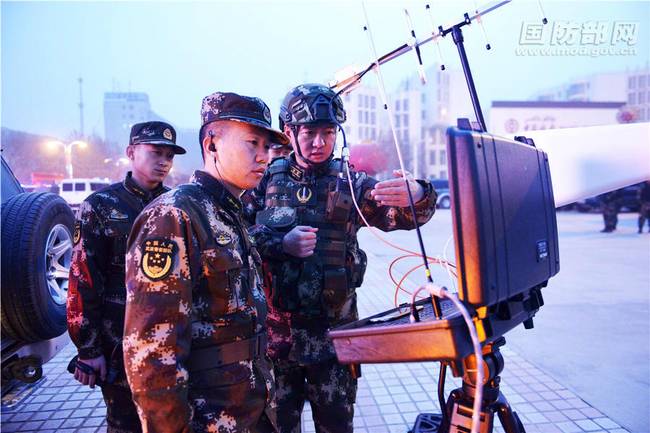Media Report

- The Washington Post comments: "Since the election of Donald Trump, the relationship between Washington and Beijing has appeared strained. Despite diplomatic efforts to bridge the gap, China and the United States are at loggerheads over a variety of issues, including trade and territorial disputes in the South China Sea. However, there is one subject close to President Trump's heart that could bring the two powers closer together: the threat of terrorism by Islamist extremists...China has long complained of the threat posed by Uighur groups based in China and abroad, often claiming that there was a "double standard" whereby acts of terrorism in the West received worldwide sympathy but those aimed at China received little international attention...In the new U.S. president, China may find a more receptive audience for its concerns about Uighur militancy. Trump has repeatedly spoken of the threat posed by the Islamic State and other extremists. He and his closest advisers have painted the threat posed by Islamist militants with a broad brush, downplaying nonreligious motives and using the label 'radical Islamic terrorism.' The shift in U.S. leadership comes as Uighur involvement with international extremist groups is growing. 'There's no denying it,' said Raffaello Pantucci, director of international security studies at the Royal United Services Institute, a British think tank, who has studied Uighur militancy."
- The LA Times reports: "Washington and Seoul plan to deploy the U.S.-developed Terminal High Altitude Area Defense (THAAD) anti-ballistic missile system on South Korean soil before the end of the year...Beijing, a longtime ally of Pyongyang, sees the system as part of a U.S. strategy to contain China, since it could also be deployed against Chinese missiles. And as THAAD's deployment date draws near, its denunciations have reached fever pitch, spurring retaliations online and in the streets. Chinese authorities have denied visas to South Korean pop stars who frequently perform on the mainland; rejected imports of South Korean cosmetics; and scrubbed at least five enormously popular South Korean TV shows — some with hundreds of millions of Chinese viewers — from Chinese video streaming sites. 'We don't have to make the country bleed, but we'd better make it hurt,' the Global Times, a Chinese state-run tabloid, said in an editorial on Wednesday. The measures have stirred anxiety in South Korea's business community, upset Chinese TV fans and cast uncertainty over the future of the China-South Korea relationship"
- The Wall Street Journal reports: "China's President Xi Jinping's considerable clout is set to be tested over the next two weeks, when nearly 3,000 lawmakers gather for an annual meeting amid building resentment within party ranks over some of Mr. Xi's policies...Mr. Xi is heading into this political season well armed, with newly installed allies in key government posts. Near the end of his first five-year term, he faces no clear challenger, having used disciplinary campaigns to neuter rivals and demand fealty from the party's 89 million members. Some party insiders say Mr. Xi may be maneuvering to stay in power beyond a second five-year term, which would be a break from recent practice...Mr. Xi 'is more interested than ever in showcasing the party's unity and its achievements.' said Matthias Stepan, a specialist in Chinese domestic politics at the Berlin-based Mercator Institute for China Studies...In recent weeks, Mr. Xi has stepped up his campaign to enforce 'strict party governance,' urging officials to demonstrate 'self-discipline.' "
Calendar
- 2017-03-01 Economic Coercion, with a Chinese Twist
- 2017-02-28 'The president always gets something': Spicer suggests Trump gained concession from China
- 2017-02-27 1st senior Chinese official visits Washington in Trump era
- 2017-02-26 For More Chinese Firms, It Pays to Make It in the USA
- 2017-02-24 China hits back at Donald Trump's 'champion of currency manipulation' jibe
- 2017-02-23 As China Ups Heat on NKorea, US Faces Questions
- 2017-02-22 Exclusive: China finishing South China Sea buildings that could house missiles - U.S. officials
- 2017-02-21 Chinese premier appeals to Washington to avoid ‘trade war’
- 2017-02-20 Chinese Bank Cleanup Plan Could Leave a Mess
- 2017-02-19 US carrier starts 'routine' patrols in South China Sea
News
- The LA Times China, upset over a planned missile-defense system, is taking aim at South Korea's pop stars and TV shows
- The Wall Street Journal China's Xi Positions Allies for Transition Battle
- The New York Times China's Bird Flu Surge Is a Low Epidemic Threat, W.H.O. Says
- The Guardian China accuses western media of 'fake news' about human rights
- The New York Times For China's Factories, a Weaker Currency Is a Double-Edged Sword
- USA Today China eyes global economic leadership as U.S. turns inward
- The Financial Times Hopes high for Xi second term despite slow pace of China reform
- The Wall Street Journal How Chinese Companies Finance Their Ambitions Abroad
- Bloomberg Tesla's China Sales Triple to More Than $1 Billion
- Reuters China drills again near Taiwan as island warns of threat
- Bloomberg China's New Watchdog to Tackle Shadow Banking, Property Bubbles
- Reuters Under Xi, wealth of China's uber-rich lawmakers grew faster than economy
- The Financial Times Isis Uighurs threaten 'rivers of blood' in China
Commentary
- The Washington Post: Opinions How Trump could find common ground with China, thanks to the Islamic State
- Forbes China Challenges Vietnam With A Revival Of Its World Factory Status
- Foreign Policy The Islamic State Pledged to Attack China Next. Here's Why.
- TIME Ordinary Citizens Are Hoping to Make a Difference at China's Biggest Political Meet-Up
- Quartz One of China's richest men presides over an army of 80,000 couriers and 30 planes
- Barron's What Top Economists Expect from China's NPC
- The Diplomat The Philippines' South China Sea Flip-Flop
